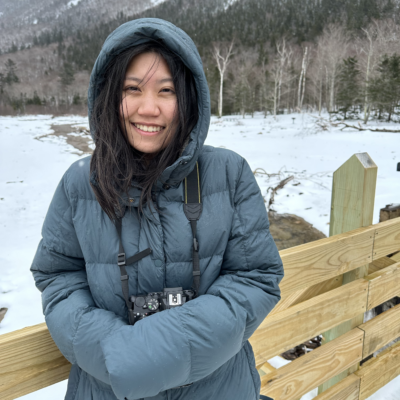Student Spotlight: Steph Tran

July 15, 2024
Steph Tran is a second year doctoral student in ecology and evolutionary biology from Arlington, Texas. She earned a B.S. in general biology at the University of Texas at Arlington and now studies how organisms adapt to rapid environmental changes under the guidance of Swanne Gordon at Cornell.
What is your area of research and why is it important?
I am broadly interested in natural history and how organisms adapt to rapid environmental changes. For my dissertation, I look at how heatwaves impact the reproductive success (mate choice, sexual selection, fertility) and disease dynamics in Trinidadian guppies. Guppies are a model organism for studying evolution happening within our lifetimes. They are successful at adapting to a variety of environments from pristine mountain streams to urban waters contaminated with sewage across the world. I believe that studying their life history and how populations change will provide insights into how they can persist in the face of climate change.
What are the larger implications of this research?
The current biodiversity crisis can be boiled down to a few main drivers including global heating. I think that there exists a disconnect between people and all of the other life on Earth, not realizing that our livelihoods are so intricately linked to the natural world around us. Understanding the mechanisms behind why some species can persist in rapid, extreme changes while others cannot can help us make predictions for the future and aid in conservation.
What lessons did you take away from participating in the Colman Inclusive Leadership Program and how will they benefit you going forward?
One of the most insightful takeaways I got from the Colman Inclusive Leadership Program was that being able to understand and utilize one’s own and other people’s emotions (so called, “emotional intelligence”) to navigate situations is key to being an effective and inclusive leader… perhaps even more important than general intelligence! This spoke out to me because I tend to approach conflicts more logically than emotionally, and it’s something I’ve been working on balancing out for the past few years. It reminds me that it’s okay to “be human” in all aspects of my life.
Why do you believe it is important to develop leadership skills?
I think that developing leadership skills is crucial to building trusting, long-lived relationships and an engaging and accommodating work environment that accomplishes short- and long-term goals. There is nothing like being on a team where everyone is motivated and supported; it allows room for exploration and innovation! However, finding something that works one time does not mean it will work the next time. What it takes to be an effective leader changes across different scenarios, dynamics, and cultures. Developing leadership skills and styles should be a life-long process.
What are your hobbies or interests outside of your research or scholarship?
Outside of research, I currently do a lot of citizen science and natural history work. I like to go outdoors, learn about all of the animals and plants I encounter, and take others with me! I do wildlife and macro photography to document what I encounter. Occasionally, I collect data for natural history collections or volunteer to help with projects. Other than that, I love painting, cooking, and learning about other cultures from my friends.
Why did you choose Cornell to pursue your degree?
I chose Cornell because of my supportive and friendly field and lab, the resources that were available for my dissertation, and because of its close connection (and location) to nature. It is vastly different from living in a large metroplex in the South, but I am growing to love it more and more.
